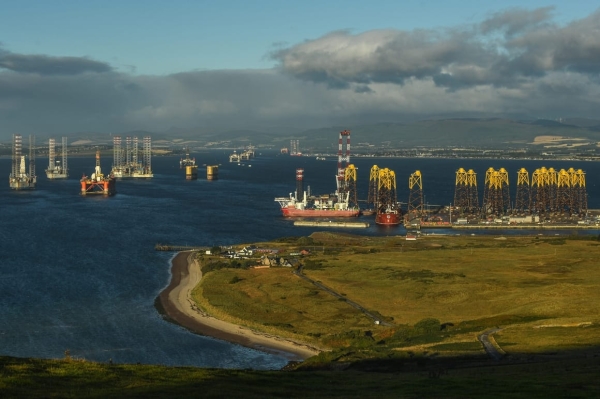UK Labour’s secret love: The oil and gas industry
After years of talking up their green credentials, the UK opposition is love-bombing fossil fuel bosses. But will the industry love them back?
LONDON — It was an unlikely stage for a political love-in.
Labour Party Leader Keir Starmer and Ed Miliband, his shadow energy secretary, headed north to the Scottish coastal city of Aberdeen last November, on a mission to woo more than a dozen North Sea oil and gas executives.
That roundtable, held in the U.K.’s traditional fossil fuel heartlands, was the highest-profile move in a 12-month political effort to shower the industry with attention. It was organized alongside a series of meetings between sector leaders and party frontbenchers in London. Anas Sarwar, Labour’s leader in Scotland, has been brought into the effort too, and joined the Aberdeen meeting.
“There has been quite a lot of engagement with the oil and gas industry in the last year, and it’s stepped up in the last six months,” a Labour official told POLITICO. One figure from the fossil fuel industry confirmed that Labour’s charm offensive means they now enjoy “more access and more dialogue” with the party. (Both individuals, like others interviewed for this story, were granted anonymity to speak candidly about Labour’s approach.)
The newfound focus is partly an extension of Labour’s broader efforts to win over business ahead of a general election expected this fall, amid conflicting challenges for how the party frames its offering to industry and voters.
The oil and gas sector is a serious chunk of the U.K. economy, worth £20 billion each year and supporting 200,000 jobs across its supply chain, including 90,000 in Scotland. The industry provides nearly half the U.K.’s fossil fuel needs, with 75 percent of the domestic energy mix still dependent on oil and gas.
But the Aberdeen trip also showed the delicate balancing act that Labour is trying to pull off — promoting a highly ambitious, very expensive Green Prosperity Plan to wean the country off reliance on oil and gas, while also trying to persuade deep sea drillers that the transition will not hit jobs or investment in their industry.
That tension will bubble to the surface in the House of Commons Monday night, when Labour MPs try to vote down legislation giving oil and gas firms more regular opportunities to bid for drilling licenses.
No wonder, then, that Miliband used his Labour conference speech in October to promise North Sea workers they would not be “left behind or left out,” in an address otherwise focused on the U.K.’s shift to clean energy.
Balancing green ideals with an appeal to oil and gas workers is also good politics. “I have always said that winning back the trust of people in Scotland is essential,” Starmer said in October after Labour defeated the Scottish National Party in a key by-election in the Scottish constituency of Rutherglen and Hamilton West. Labour’s route to Downing Street becomes a whole lot easier if it finds a way to build that trust and pick up even more seats from the SNP in Scotland later this year.
It is a sign of the challenge ahead for the party — but also, Labour insiders claim, a signal that the opposition has found a way to package up its energy ambitions as part of a big economic offer to voters.
The offer
Three Labour officials, including the one quoted above, stressed that the overtures to oil and gas are about having an open and frank dialogue with the industry, even when they disagree.

But it is about time Labour found a way to sweeten its deal on fossil fuels, according to one energy executive, who described the party’s current policies as “a very unattractive regime.”
Labour plans to scrap investment relief in the windfall tax levied against North Sea producers, and is set to ban new oil and gas licenses (although it will not cancel existing ones.) And that is before Monday’s vote.
Prime Minister Rishi Sunak sees an opportunity to draw big dividing lines over energy policy, pledging to “max out” drilling in the aging North Sea basin, delaying the impact of expensive green rules on electric vehicles and boilers, and repeatedly attacking the borrowing plans behind Labour’s promise to ramp up green spending to £28 billion a year.
Treasury time
Labour’s efforts to win over oil and gas have coincided with a growing involvement in energy policy from key frontbenchers, suggested the first Labour official quoted above, especially Shadow Chancellor Rachel Reeves and Shadow Business and Trade Secretary Johnny Reynolds.
“For a number of years, the policy was viewed exclusively through a green lens,” they told POLITICO. “Maybe other people in the shadow Cabinet were slow to realize it had a fairly substantial impact on their brief, particularly Johnny and Rachel.”
But now, they continued, “you are seeing a much more collaborative approach — rather than Ed Miliband running this entire thing, Ed Miliband is the driver behind the clean power stuff, Johnny is doing a lot of the work of talking to business, Rachel is looking at the tax framework, and then there are the skills implications of training people up in these industries.”
It is all part of the opposition’s coordinated efforts to work with the private sector, another senior Labour figure told POLITICO, who said the party was “proud to have repaired our relationship with business.”
“The expertise in the oil and gas sector is substantial and Labour draws on a wide variety of voices in the energy sector to make sure we get the transition right for British workers and the economy,” they added.
Routes to victory
There are definite electoral advantages to lovebombing the fossil fuel industry, at a time when Labour has just two MPs in Scotland but is forecast to win 24 seats at the general election.
Most of those target seats are in the “central belt” around Edinburgh and Glasgow, rather than the industry’s base in the north east of Scotland, but Fergus Mutch, managing partner at consultancy group True North and a former head of communications for the SNP, says the “language of oil and gas” resonates beyond the north east because the whole country’s economy “depends on the fortunes of North Sea oil and gas.”
“If Labour plays the game, or are seen to look good for Scottish business — creating jobs, turbocharging the energy sector, supporting oil and gas in the interim in a way that unlocks the opportunities in offshore wind and carbon capture, in all of these new emerging technologies — then I think they’ll be on to a winner,” he added.
Paul de Leeuw, director of the energy transition unit at Robert Gordon University in Aberdeen, an apolitical role, told POLITICO that Labour’s focus on fossil fuels reflects the fact that around one in 30 people employed in Scotland either works in or supports the oil and gas industry. “Getting this right, and getting the energy future right, is actually a fundamental part of strong economic development, and therefore it is in the political spotlight for that reason,” he said.

Either way, the move has won some influential fans. Gilad Myerson, executive chairman of Ithaca Energy, a minority partner in Rosebank, the North Sea’s largest untapped oilfield, told POLITICO: “The Labour Party is especially focused on job creation and economic stability, and they understand the importance of investing in our own assets as opposed to directing investment internationally, to support the creation of thousands of U.K. jobs.”
Another industry figure, unimpressed with what they see as persistent policy tinkering from the government, praised “elements within the Labour Party that are focused on industrial jobs.” That focus made Labour easier to deal with than their Conservative counterparts, they said.
Trouble at the top
But not everyone in the oil and gas world has been charmed. And for some, the trouble starts at the top.
The first executive quoted above said the Aberdeen summit left them worried Starmer did not wholly understand the challenges facing the industry.
At the meeting, Starmer admitted "he didn’t sufficiently understand some of the issues that we’re talking about,” they told POLITICO, suggesting the leader wasn’t well briefed on U.K. reliance on fossil fuels.
And concerns are not limited to the Labour leader.
While Miliband joined his boss in Aberdeen and at other meetings with fossil fuel executives, two oil and gas figures said that the shadow energy secretary has not been central to their discussions with Labour. Reeves and Reynolds have led those conversations instead, the executives said.
One of them said they believed Miliband was not “a major influence” on the party’s North Sea oil and gas policy, a claim Labour robustly denies.
A party spokesperson said: "The shadow energy secretary regularly engages with the sector as the party prepares for a general election.”
Labour was the only party with “an industry-backed plan to deliver energy security for our country,” they added.
One of the Labour officials quoted earlier in the article told POLITICO that any perceived shift in responsibility for energy policy was simply because Labour frontbenchers were working “all hands to the pump” in the run up to an election.
Unsurprisingly, Scottish Conservatives are unconvinced by Labour’s balancing act. "Anas Sarwar and his colleagues are still pursuing a policy that would endanger one of Scotland’s most important industries, and tens of thousands of skilled jobs," said Douglas Lumsden, a Tory member of the Scottish Parliament who represents North East Scotland.
UK NATIONAL PARLIAMENT ELECTION POLL OF POLLS
For more polling data from across Europe visit POLITICO Poll of Polls.
Playing with policy
Meanwhile, Gary Smith, secretary general of the influential GMB union, which represents oil and gas workers, warned that Labour cannot attract the investment it has promised in new green tech without his members, many of whom may shift across to deliver the ambitious low-carbon economy Starmer has promised.
He told POLITICO: “We need to be very careful with future investment because we are going to need the offshore companies and industries to invest in carbon capture and storage. They’re going to have to invest in hydrogen. They’re going to be the companies we need to invest in floating wind.
“These are global companies, and if the climate is too difficult to invest in the U.K. — if the political environment is too difficult — the investment will just go elsewhere.”
A general election is probably 10 months away. Labour goes into the long campaign with both a cautious welcome from fossil fuel execs and a warning.
One oil and gas industry figure said they would “characterize [Labour] as being in listening mode more than in full engagement.”
“The feeling I get is that they are — and this isn’t necessarily a criticism — still in this kind of information gathering stage,” they continued.
But Labour isn’t quite the finished article in this area. “I don’t yet feel they’re ready to work with us to develop policy,” the figure said.






